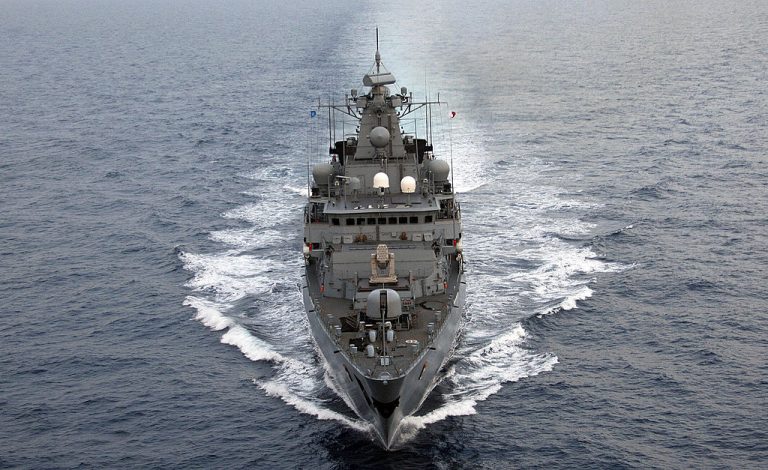The German navy frigate Bayern made a port call in Tokyo on Nov. 5. This is the first time in two decades that a warship from Germany has visited Japan. The Bayern, which left German shores in August, is on a seven-month deployment and will remain in Tokyo until Nov. 12. During its stay in Japan, Bayern will participate in a 20-ship joint exercise.
According to Japan’s Ministry of Foreign Affairs, Bayern will engage in surveillance and monitoring of “illicit maritime activities” in mid-November. This includes ship-to-ship transfers involving North Korean-flagged vessels. Those are banned by the United Nations Security Council Resolutions (UNSCR) in waters surrounding Japan, including the East China Sea. This will be Germany’s first time engaging in such activities in the region.
“Japan welcomes these activities from the viewpoint of ensuring effective implementation of the relevant UNSCRs while maintaining the solidarity of the international community for the realization of North Korea’s dismantlement of all weapons of mass destruction and ballistic missiles of all ranges in a complete, verifiable, and irreversible manner,” the ministry said in a statement on Nov. 5.
Japanese Defense Minister Nobuo Kishi visited Bayern on Friday. At a news conference after inspecting the ship, Kishi said that Bayern’s visit is intended to show the “strong determination” of both nations to make “active contributions” to peace and stability in the Indo-Pacific region. Kishi also discussed a wide range of issues with his German counterpart, General Eberhard Zorn.
After spending time in Japan, Bayern is scheduled to visit South Korea and sail through the contentious South China Sea region. Beijing has been building up artificial islands in these waters to strengthen its claim in the area. However, neighboring nations like Vietnam, Philippines, and Japan have all rejected communist China’s excessive territorial claims.
Success
You are now signed up for our newsletter
Success
Check your email to complete sign up
Clemens von Goetze, the German ambassador to Japan, said during a news conference that Bayern’s passage through the South China Sea will show that Berlin and Tokyo are committed to freedom of navigation and international law.
Despite Germany increasing its military presence in the Indo-Pacific, Nils Schmid, foreign affairs spokesman for the Social Democratic Party, feels that his country’s military will not be highly active in the region. He believes there will be a “division of geopolitical labor” whereby the U.S. will be active in the Indo-Pacific while Europe will focus on the Middle East and Africa.
“In strictly military terms, it does not contribute much, but in diplomacy symbolism and language is very important. And I think it was the right thing to do. Maybe one day we will see a European fleet navigating through the Indo-Pacific, that would be fine. But in order to defend Taiwan or South Korea or Japan, in purely military terms, it will all depend on the US, and the US knows that,” Schmid told SCMP.
In an interview with DW, James Brown, Temple University associate professor of international relations at the Tokyo campus, explained that the German warship’s visit to Japan is a continuation of Tokyo’s policy of extending invitations to warships from allied nations like the UK, Netherlands, and France. The policy aims to boost Tokyo’s international alliance.
“From Tokyo’s perspective, the more warships from European nations or other democratic partners that come to the region the better, as it sends the message to China that Japan is not alone, it is not isolated and that it will not be pushed around,” Brown said.
Meanwhile, communist China has been reacting sharply to Western warships sailing into the Indo-Pacific. In September, Beijing denied Bayern’s request for a port call at Shanghai.















